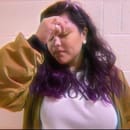(Photo provided by Xochitl Morales)
From leading protests and spoken word performances to producing albums, college sophomore Xochitl Morales ’22 has found ways to intersect her art with activism for causes she’s passionate about. In this interview, Xochitl talks about home, the roots of her activism, and how she uses performance art to bring attention to the causes she’s passionate about at home and at Harvard.
Tell me about yourself and your life before Harvard. Where did you grow up? Where are you from?
I grew up in Delano, which is where Cesar Chavez had all of his boycotts, so in middle-of-nowhere California. It’s super rural and everyone that I knew growing up worked in the fields or had parents who worked in the fields. I also worked in the fields in the summer for extra money. I was born in L.A., so I always had a connection to the city too, but for the most part, I grew up in Delano, going to L.A. like 4 times a month. When my sister, who is 10 years older than me, moved out to L.A. permanently, I practically lived there with her, so I really identify with the cities of L.A. and Delano. My parents met in L.A. My mom grew up in L.A. and my dad immigrated from Mexico to L.A. My dad was a mariachi and my mom went to the restaurant where he was playing, and that’s how they met. Mariachi has also been a big part of my life growing up. I started playing when I was five years old in Delano and have been doing that forever. I play all the mariachi instruments and my dad was a teacher in Delano so he taught me and my sisters everything. I also did spoken word in high school pretty intensely. I competed and was part of a troupe called Get Lit and all throughout high school I did that. I was a commissioned spoken word artist, which is how I got introduced to activism because I would go write poetry for rallies, protests, and galas for fundraising for nonprofits. That’s all the stuff I did before I came to Harvard.
What are the social issues and communities you are passionate about?
My roots with activism come from growing up in Delano and growing up in the legacy of Cesar Chavez and Dolores Huerta. The first slam poem I ever wrote was actually about pesticide poisoning in farmworkers and economic injustice so that was something I was really passionate about back home. I’m also passionate about advocating for workplace protections for farmworkers, and as I started doing more work in L.A., where the troupe I was in was based, I got really into arts advocacy and education reform for equity in terms of race and socioeconomic status. So, building a curriculum that reflects black and brown identity. Through that, I also got involved in reproductive justice because I also wrote some poems about the Woman’s March and for Planned Parenthood. That was very big when Trump got elected, so I did a lot of work with that. Then when all the March For Our Lives stuff was going on I did a poem with the campaign that aired at the march in D.C. so I do a lot of advocacy there. I was just all over the map. But I also stayed connected to everything. The biggest thing is that I never stopped working on immigration stuff. My dad is an immigrant, my grandparents on my mom’s side are immigrants and it has just always been a part of my life, and my advocacy has always centered around it too. Even within reproductive justice and gun violence, the focus has always been on the immigrant experience and the immigrant community and how those things affect them, particularly Latin American immigrants. So here (at Harvard) I have been working on a lot of TPS stuff with Comite TPS and I’m working on a campaign right now called the Dream and Promise Campaign which is working to get the HR6 bill passed. It has always been things that revolve around my families and my identity.
How has your activism changed since you’ve gotten to college and how did your activism back home influence how you participate on campus?
It’s been weird transitioning into college with advocacy and activism because when I was doing it at home, especially in terms of economic justice and all the farmworker stuff, it was all happening right in front of me and it was very much affecting my everyday existence. When I came here it all started to seem very far removed. The experiences that I had at home are unheard of here. If I told anyone about farmworkers in the central valley still experiencing pesticide poisoning it would be like, “wtf” and it all seems so distant almost to the point where I hardly even know what’s going on anymore. That’s what happened in the fall semester of my first year. Things have changed since then but that semester was hard to keep myself grounded to those same experiences I had back home. So, coming here a lot of the advocacy that goes on here is in regard to the college and whether it’s divestment or getting an ethnic studies program it’s all stuff that’s very important, but also really far removed from our lives outside of Harvard. The urgency is still there especially with prison divestment and fossil fuel divestment, but it’s no longer something that we see in front of us. When I was organizing at home, people knew what was going on and it was right in front of them. Here you have to build urgency because people don’t SEE it. Even with divestment, it’s hard for people to see what the impact divestment has. So, the university is almost like a mask or a wall that separates us as students from the real-life experiences we’re organizing around. And that’s frustrating, but I think it still works that has to be done and has the same amount of urgency no matter where we are.
Yeah, it’s so hard especially when you’re physically very removed from the issues, but it’s amazing that you still see that urgency we need to build within the Harvard community.
Yeah, there’s nothing wrong with organizing around Harvard community issues because in the end, we exist here. The organizing that happens here on campus is so important because safety is important and accountability is important, but it’s also important that we don’t silo ourselves inside the university. It’s important because we live real lives and the people we care about are still in those situations that are extremely urgent to their lives and to their survival. It’s just important that while we organize around issues that affect us individually here on campus, we still recognize the kind of organizing we can do to affect our communities back at home and black and brown communities around the country. It’s so important but it’s so much harder to see. That’s just something I’ve been reflecting on a lot especially with divestment.
So, you do a lot of work with the divestment campaign rallies and protests. How have you incorporated your art into these protests, demonstrations, and activism in general?
So, I’m not an organizer for HPDC (Harvard Prison Divestment Campaign), but I have done work for them, and I definitely show up. I am also someone that is always available to help mobilize. The arts have always been my way of calling people to action and also my way of solidifying a sense of unity and community at those events. It’s so important because showing up to a rally is one thing, but feeling energized by a rally is another thing. Feeling energized at a picket line, feeling energized at a protest is so important and the arts is such a good way to do that. So, with the delivery of the petition to Bacow for the divestment campaign, where I performed a couple of songs at the rally, there was a moment where everyone was just kind of silent and feeling each other’s energy instead of feeling the energy through like chanting, which is also important. But those moments of silence where you literally just feel people’s energy is so powerful. The songs we sing and perform are songs that carry the legacy of other protests and other movements.



